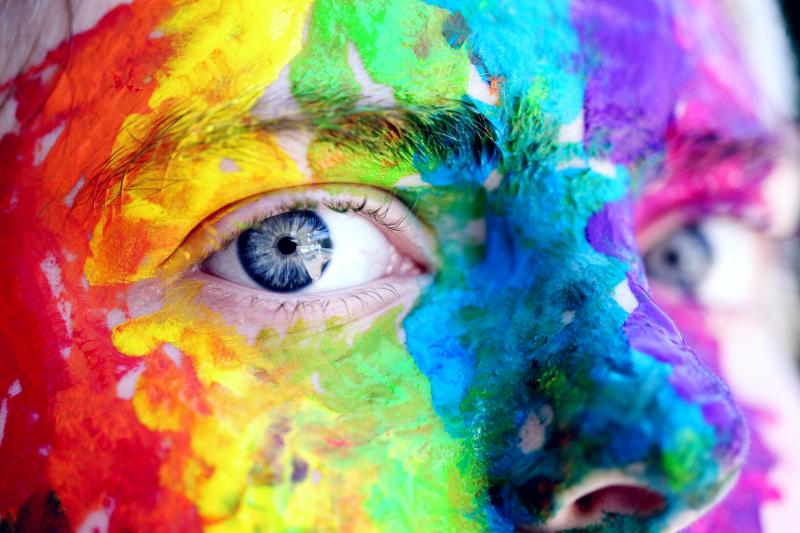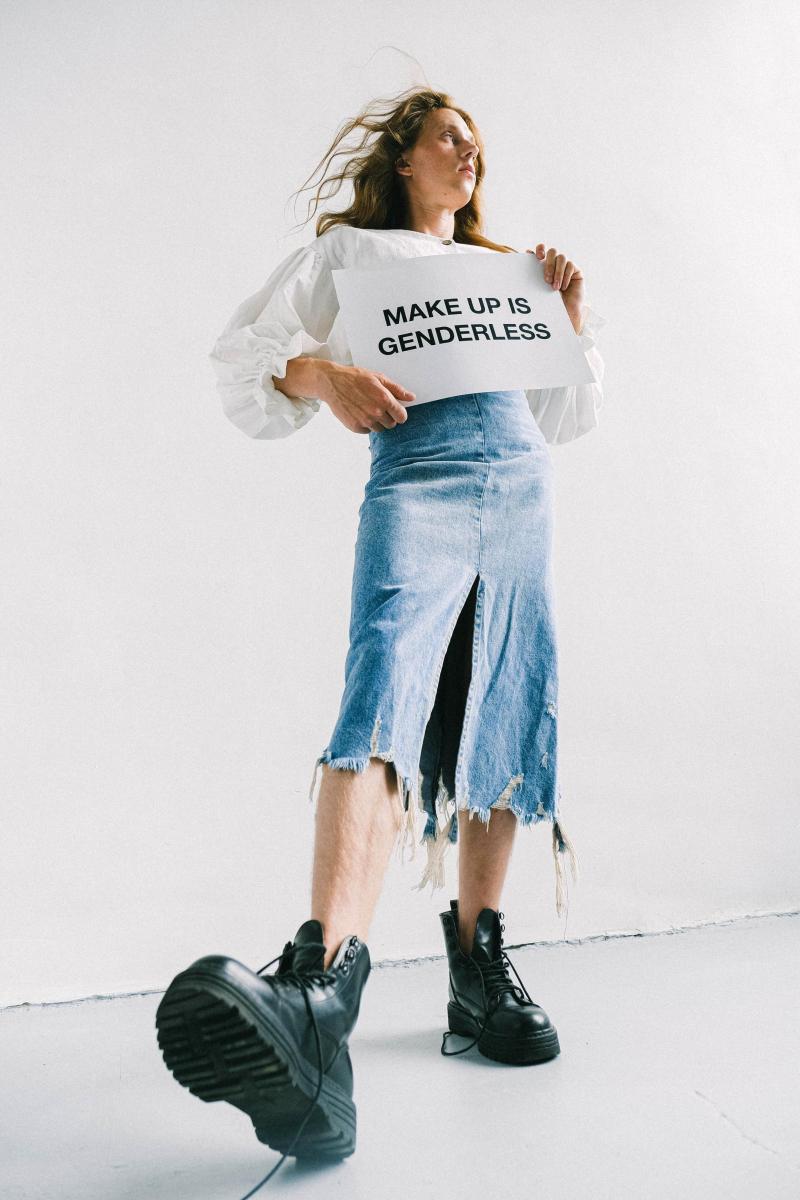Gender and sexual preference
Gender refers to the characteristics, attributes, talents and expectations around femininity and masculinity. Sexual preference is about who or what you find attractive.
I didn’t feel completely at home with the boys. It can be very difficult to feel different, but it can also be an enormous strength and added value in your life.

Did you know this?
Not everyone who is born with male or female sex characteristics identifies as a man or as a woman. Research shows that 0.7 per cent of those with a male birth gender and 0.6 per cent of those with a female birth gender identify with another gender than their own birth gender. It is not always easy to tell those around you about your sexual identity.
Classic gender roles
Gender roles are ingrained in our society. We think, for example, that it is mainly women who clean and cook, and we are more likely to ask a man to move a heavy cabinet. The same applies to study choices. Subconsciously, we pass on these gender roles and thus continue the classic division of roles. But the traditional distinction between man and woman is insufficient to describe the complex reality.
Gender identity versus sex
Sex refers to your biological sex, to the biological differences between people. It is determined at birth. In most people, the sexual characteristics are exclusively male or exclusively female. In the group we call intersex, there is a variation from female or male sexual characteristics. This occurs in 1.7% of all births.
Not everyone born with male or female sex characteristics identifies as a man or as a woman. Gender identity refers to an inner feeling of either masculinity or femininity, of both or of neither. If the biological sex does not correspond to the gender identity, one speaks of transgender. Cisgender, on the other hand, means that one's biological sex does correspond to their gender identity. Gender identity is more about how someone feels. There are different gender identities: man, woman, queer, non-binary, bigender, gender fluid, agender, gender-neutral, pangender, third gender ... Transgender is the umbrella term for everyone who does not feel cisgender.
LGBTQIA+
In our society, there is still a strong dualistic view on sex and gender: you are either a man or you are a woman. But many people do not recognise themselves in this division into two sexes or genders and/or feel uncomfortable with it.
LGBTQIA+ is an acronym for sexual diversity, gender and sexuality. It is an abbreviation of the following words:
- lesbian: women who are attracted to women
- gay: men who feel attracted to men
- bisexual: people who are attracted to both men and women
- transgender: umbrella term referring to the group of people who do not identify with their birth gender
- queer: umbrella term including several non-normative identities and sexuality experiences
- intersex: refers to people with a variation from female or male sexual characteristics
- asexual: refers to people who have little or no sexual desire
- +: refers to other gender identities, gender expressions and sexual preferences
Gender doesn’t have to be black and white; it comes in all shapes and colours.

Romantic and sexual orientation
Romantic orientation is about who you fall in love with, while sexual orientation is about who you find sexually attractive. Both orientations can coincide, but not necessarily. There are a lot of orientations, such as homosexual, asexual, pansexual ... And thus homoromantic, aromantic, panromantic ... Your orientation can change in the course of your life.
Gender expression and gender dysphoria
Gender expression is the expression of your gender through, for example, clothing, speech and behaviour. How this happens can vary widely. It is also subject to culture and upbringing.
It's possible that you are so unhappy with your body and your gender that it causes you a lot of stress. This is also called gender dysphoria. You may feel unhappy but also anxious because your gender identity does not correspond to the sex you were assigned at birth.
Transition
If you feel that the gender with which you identify does not (quite) fit your body, you can choose to transition to a body in which you feel more like yourself. This can be done by taking medical steps, but there are also other ways to achieve a more masculine, feminine or neutral appearance.
A transition is a very individual process: only you can decide what is necessary for you to feel more comfortable with your body and gender identity. It is important to know that there are many possibilities, but also that nothing has to be done and there is no predefined process that you have to go through. For example, some transgender people feel that medical steps are unnecessary and that is totally okay.
On the website www.transgenderinfo.be you can read about ways to feel better in your body. You will find information on the masculinisation and feminisation of your body or appearance. For most transgender people, a transition is an intense period. On gendervonk (Dutch), in the 'Feel good about yourself' section, you can read how to deal with difficulties during a transition.

Coming out: tell those around you
At some point you may want to tell the people around you about being transgender. This coming out is a process that usually takes some time. For many transgender people, telling people about your gender identity for the first time is stressful; for example, it is not always easy to predict how someone will react. Many transgender people are afraid of negative reactions, but are also relieved afterwards.
Decide for yourself how open you are about your transgender identity, and who you like to tell about it. You are not obliged to do anything.
There are different ways to inform people about your gender identity. It is best to prepare for this. On Gendervonk you will discover how to make a concrete plan of action.
Sexual harassment and assault
Transgender people experience (sexually) transgressive behaviour – both verbal and physical – more often than cisgender people, About 30% of transgender people have experienced a form of sexual violence. The aggressor can be either a known or an unknown person. Sexual harassment and assault can cause psychological, sexual and social problems.
Talk about it
Talking about your uncertainties or experiences can be a relief and help you to sort things out yourself. Talk to someone you feel comfortable with and trust – preferably someone you know, such as a good friend, your parents, sister or brother.
If you don't feel comfortable talking to anyone close to you, try talking to someone who is familiar with similar experiences. This could be a psychologist or someone from student services at your college or university.

Would you rather tell your story anonymously? Then you can go to Awel (102 or awel.be) or Tele-Onthaal (106 or tele-onthaal.be). If you have questions about suicide, contact the Suicide Line (1813 or Zelfmoord1813.be).
Searched and found: students & expert share their experiences
In this episode, our host Carola discusses gender and sexuality. She does so in the company of student Maja and dr. Alexis Dewaele (UGent) who is an expert researcher on sexual health, minorities and coping.
Keen to learn, read, more about the topic?
Podcasts
Ted Talks
- Are you 100% straight? (Dutch)
Websites
- Sensoa – promotes sexual and reproductive health and rights, including around HIV and AIDS, and aims to influence the international decision-making process in this area. (Dutch)
Organisations
- Merhaba unites and empowers LGBT+ individuals with a migration background. (Dutch)
Powerful stories
You are not alone. Get inspired by other students' stories about vulnerability and doubt. But above all about the power of connectedness.
Go to the stories